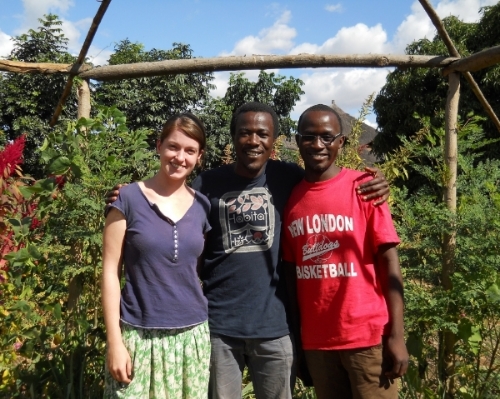Research Project
I first learned about permaculture during a trip to Malawi in 2006 on a tour of a permaculture organization and continued to learn about it on subsequent trips to Malawi in 2008 and 2010. During these trips, I became interested in the extent to which farmers could use permaculture to address food security and agricultural problems. Previous research and anecdotal reports from the NGOs pointed to potential benefits from permaculture practices as well as socio-cultural, economic, political, and environmental constraints to permaculture adoption.
For my dissertation research, I decided to evaluate the impacts of using permaculture by comparing the agricultural practices and food security of smallholder conventional farmers to farmers who use permaculture. I conducted research with local research assistants Geoffrey Mlongoti, Chisomo Kamchacha, and Enock Chitheka who translated from the local language, Chichewa, and helped design and conduct the research. Sia Mwale also helped with transcription and translation. We conducted research from September 2011 to July 2012 in Lilongwe Rural District in partnership with the two permaculture organizations I visited on previous trips.
We designed the research activities to answer a central question:
Given cultural and structural constraints to the implementation and adoption of permaculture practices, can smallholder farmers use permaculture to improve their household food security?
(This research was funded by: the U.S. Environmental Protection Agency (STAR Fellowship Assistance Agreement no. 91732301), American University, and the Explorers Club Washington Group)
Acknowledgements

I owe a special thanks to:
- Research collaborators Geoffrey Mlongoti, Chisomo Kamchacha, and Enock Chitheka.
- All the participant farmers - without whom I could not have learned so much.
- Everyone in Malawi who helped me complete this project through their guidance, advice, patience, and friendship.
Research Methods
- Research team
- Geoffrey Mlongoti, Chisomo Kamchacha, and Enock Chitheka
- Research participants
- 16 permaculture farmer households
- Defined as: (1) self-identify as practicing permaculture; (2) exposure to demonstrations or information about permaculture from an NGO; and (3) intentional use of multiple permaculture practices in one place.
- 28 conventional farmer households
- 16 permaculture farmer households
- Observation and participation in activities
- Farming, cooking, meals, permaculture trainings, nutrition clinics
- 185 semi-structured interviews
- Food and farming practices, permaculture, nutrition, health
- 237 surveys
- Food security measure
- 24-hour diet recalls
- Demographics, livelihoods, crop production
- 14 focus groups
- Food and farming practices, health, permaculture